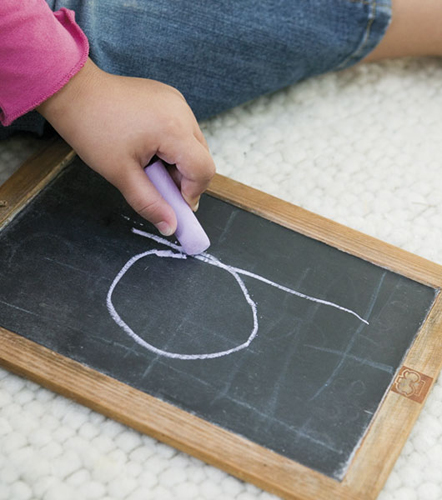Myths and misconceptions Is it true that…
| Q: |
Children who are hyperactive or have behavioral problems should not have soda?
| | A: |
Yes and no.
Some sodas have very high sugar levels and caffeine, and may contain
artificial additives, which will lead to an immediate energy rush
followed by a blood-sugar crash. For
some children with high activity levels, this may escalate some of their
behaviors. Not all sodas contain these products, but many parents find
it easier to just avoid them completely.
|
| Q: |
There is no point in reading to my child now that he can read by himself?
| | A: |
Definitely
not true! It takes years of practice to become an accomplished reader,
and listening to you will really help your child improve his skills.
If your child struggles with reading, writing, or spelling, reading
with him is one of the most helpful things you can do. Learning aside,
reading is also a great way to spend some quality time together.
|
| Q: |
Using pictures with my child will make her lazy with her language?
| | A: |
Quite the
opposite. Pictures will help your child to better understand what is
expected of her and to express her own needs, wants, and feelings.
Reducing her frustration in this way means that your child will be more
motivated to communicate using spoken language alongside any visual
supports she may have.
|
Dyslexia A language-based difficulty
Children with
dyslexia have significant problems with reading, writing, and spelling.
This condition is often referred to as a specific learning disability,
which can be a confusing term as most children with dyslexia are as
intelligent as their classmates. It is estimated that five to 10 percent
of the population is affected by dyslexia to some degree, with more
boys receiving the diagnosis than girls. However, some experts argue
that girls may be better at hiding their difficulties by relying more on
their verbal skills. Boys, on the other hand, are more likely to be
disruptive in school as a result of their learning problems, and so are
more likely to be assessed and identified.
| Q: |
What does it mean for my child?
| | A: |
Before starting school, your child may have had difficulties in
developing clear speech, found it difficult to understand the connection
between rhyming words such as “cat” and “mat,” and had some
coordination problems. In her first years at school, she may have had
difficulty in learning the alphabet and multiplication tables, struggled
to read more than a few simple words, found it hard to tell left from
right, and had problems remembering common sequences such as days of the
week and months of the year. Without the right support, she may become
frustrated due to lack of progress and feelings of failure, which could
result in behavioral problems or in her becoming increasingly quiet and
withdrawn.
Research has shown
that people with dyslexia make more use of the right hemisphere of the
brain, which is involved in creative thinking. As a result, your child
may have good verbal and social skills, be able to think laterally and
solve complex problems by making unexpected connections, have good
visual skills, and be able to see the “big picture.”
|
| Q: |
What causes it?
| | A: |
Children are born with an innate ability to learn spoken
language. However, reading and writing are relatively new behaviors in
terms of human evolution, and require children to master a complex set
of skills. Phonological processing theory argues that, in order to read,
children must first learn the sounds (phonemes) associated with the
shape of written letters (graphemes). These building blocks can then be
fitted together to build whole words. Children with dyslexia are known
to struggle with breaking words down into their different sounds.
However, some experts argue that this is a symptom of dyslexia rather
than the main cause.
It has also been
suggested that, in the early stages of speech development, children with
dyslexia are significantly slower and make more mistakes when repeating
words—for example, when singing nursery rhymes with you. These
articulation difficulties lead to problems in understanding the sounds
of similar words, which leads to difficulties in developing an awareness
of the written appearance of these words. Research evidence shows that
children who develop the skills of recognizing the sound and visual
similarities of words at an early age become good readers, and those who
struggle go on to develop reading difficulties.
|
| Q: |
What can I do to help my child?
| | A: |
In school, your child may require a degree of one-on-one or
small-group teaching. How much will depend on the severity of your
child’s difficulties. Both at home and at school, your child will
benefit most from approaches that are:
Multisensory:
Encourage
your child to use as many senses as possible when learning, for example
looking at a letter, saying its name and sound, and writing it in the
air all at the same time.
Structured:
Help
your child learn in small steps, building on what she has already
mastered. Don’t overload her, and take care to only introduce new
challenges once she feels confident with what she has learned so far.
Reinforcing:
Your
child will need more help and practice to learn the basic skills of
reading and writing, and will benefit from regular review with lots of
praise and encouragement. Set
aside 10–15 minutes each day when you can sit down and read with her.
Paired reading is a great way to support your child in developing her
skills. Ask her to choose the book you will read—books that are about
subjects she is interested in will be far more motivating for her. Sit
side by side so you can both see the text and begin reading together.
Make sure you adjust your pace to match your child’s. When she is ready
to read alone, she should signal for you to be silent. If she struggles
to read a word, give her a few seconds then tell her what the word is.
Be patient—stay calm, cool, and collected—particularly if it is a word
you know she has read dozens of times before. Let her read the word
correctly, praise her for it, then move on. Afterward, talk with your
child about what you have read and answer any questions she may have.
Research shows that children who do paired reading with their parents
show improvements at three times the speed of other children. Many
children with dyslexia feel more comfortable using a computer to write
and learn, and it may be possible for your child to do part of her
schoolwork in this way. Word-processing programs use spell-check and
auto-correct features that will help her identify mistakes with her
writing. There are also lots of fun and engaging websites and
educational software packages that she can use to support her learning.
|
| Q: |
How do I get my child assessed?
| | A: |
If your child shows an unexplained difficulty in reading,
despite having the necessary intelligence and verbal skills, speak to
her teacher about a dyslexia screening test or assessment. Assessments
should be carried out by trained specialists—this will usually be a
teacher with expertise in working with children with dyslexia, an
educational psychologist, or a neurologist.
|
Technological aids
Your child may be able to do some of her school work on a computer, which can help if she struggles to write.

Lots of practice
Your child may find it difficult to form letters, so be prepared to help her go over them again and again when she’s learning.

Bookworm
Extra help with
reading will be needed, since your child will probably find it hard. Sit
side by side and read a book he enjoys together.

|